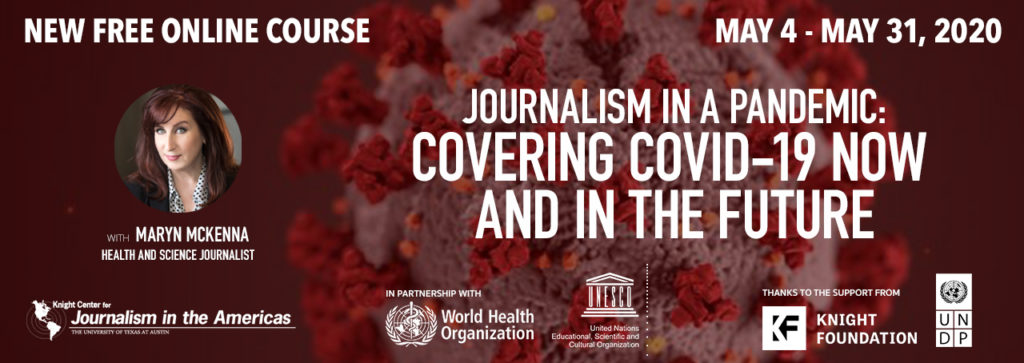Nearly 9,000 people from 162 countries registered for the massive open online course (MOOC) “Journalism in a pandemic: Covering COVID-19 now and in the future,” offered from May 4 to May 31 by the Knight Center for Journalism in the Americas, in partnership with UNESCO and the World Health Organization, with support from UNDP and the Knight Foundation.
The course content was compiled and reorganized as a self-directed online course that has just been published on the Knight Center’s newly created website JournalismCourses.org. It’s now available to anyone, from anywhere in the world, at any time. In this modality, journalists can take the course at their own pace.

This successful MOOC was led by Maryn McKenna, an award-winning science journalist, author and TED speaker, with co-instructors in each of the three other languages of the MOOC, besides English: Amanda Ross, a Brazilian data-journalist, in Portuguese; Federico Kukso, a science journalist and author from Argentina, in Spanish; and Yves Sciama, a science journalist from France and president of the French Association of Science Journalists, in French.
Now, all the instructional content from the four modules in English, French, Spanish and Portuguese is accessible to anyone without registration, log in or any other requirement, on the Knight Center’s Journalism Courses website.
“We may add versions of this course in other languages, with help from our United Nations partners,” said professor Rosental Alves, founder and director of the Knight Center for Journalism in the Americas at the University of Texas at Austin. “Chinese, Russian and Arabic versions are already in the works and we are hopeful that we can announce those versions soon.”
The self-directed course available at JournalismCourses.org follows the same structure of the MOOC, divided into four instruction modules, plus an introductory one. Each module contains video classes, interviews with guest speakers and reading materials.
Module one covers the past history of pandemics and disasters in the 20th century, examining how the world responded to influenza, smallpox, polio and HIV, and asks whether governments implemented plans they made to respond to future pandemics, and what was missed.
Module two examines the unfolding of the 2020 pandemic in its first four months, addressing healthcare crises, international supply chains, and debates over social distancing and mask-wearing, with special attention to how governments with differing levels of resources have responded in different parts of the world. It also addresses the importance of protecting freedom of expression and detecting and combating misinformation and disinformation about the pandemic.
In module three, students will learn about the competing claims for treatments or COVID-19, including drugs now on the market as well as those entering trials, and the timeline for achieving a vaccine and an antibody test intended to prove immunity. It will also examine the role of hype and media bias in advancing and debunking some proposed treatments.
And module four proposes the most important story angles to be considered, across a number of beats, in the weeks, months, and two years from the moment this course was created (May 2020). It also addresses the critical issue of journalists’ self-care as the emergency continues.
“Journalists around the world are in need of training, as most had no experience with coverage of health and science issues and were suddenly pushed to the coverage of the pandemic,” said professor Alves. “We are grateful to the support UNDP gave to this project and the collaboration with WHO and UNESCO, so we can offer this small contribution to thousands of journalists in need of more knowledge on how to improve their coverage of COVID-19.”
“We are also grateful to Maryn McKenna, Amanda Rossi, Federico Kukso and Yves Sciama for their dedication and commitment to make this program so successful,” said Alves. “Having this training available for free to journalists on our website will extend even more the outreach of the course Journalism in a pandemic: Covering COVID-19 now and in the future.”

Knight Center for Journalism in the Americas
300 West Dean Keeton
Room 3.212
Austin, TX, 78712
Phone: 512-471-1391
Email: journalismcourses@austin.utexas.edu